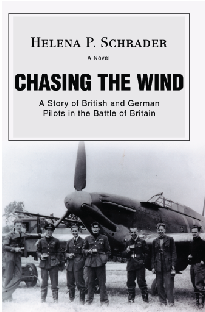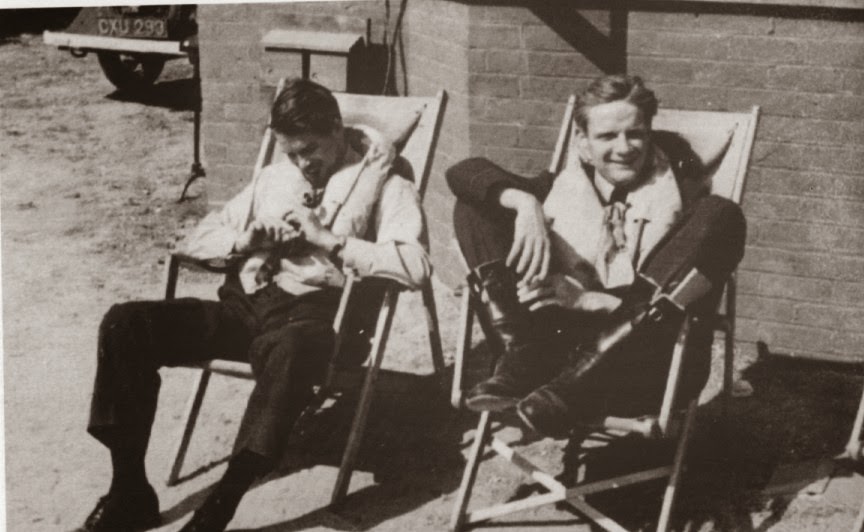An excerpt from Chasing the Wind (Kindle: Where Eagles Never Flew):
Tea time. Priestman joined the other pilots sitting in the shade of the mess tent. They were drinking tea. No sooner had Priestman sat down than the airman/cook shoved a mug of hot, sweet stuff into his hand. Priestman smiled up at him, "You're a marvel, Thatcher."
"Just doing my job, sir."
"Doing a damned good job, if I may say so, Thatcher."
"Thank you, sir." The airman looked embarrassed, as if he didn't know what to do with appreciation -- and that made Priestman feel guilty; obviously he and his colleagues were a little too sparing with praise and thanks.
The telephone was ringing in the ops tent. They turned their head and stared at the tent, waiting.
"Maybe it is just someone ringing up to see how the weather is over here."
"Or someone calling to ask if there is anything we lack?"
"Maybe someone has just signed a surrender."
No, it didn't look like that. Yardly was standing in the entry, waving furiously at them.
"Once more unto the breach, dear friends, once more," Shakespear intoned as he set his mug aside.
"I don't like that damned quote!" Roger told him irritably -- much too irritably. You could tell his nerves were a bit frayed. He'd had an ugly belly landing the other day and hadn't been the same since, really.
"Why ever not?" Driver asked innocently.
Yardly was shouting at them to "get the finger out," but they ignored him. After all, he wasn't flying, and they didn't presume it would make much difference to the war if they were a minute or two later. It was all a cock-up anyway.
"It's the next line," Priestman explained to Driver, putting his own mug aside carefully.
"What's that?"
"Or close the wall up with our English dead," Priestman told him.
***
Priestman couldn't sleep. He was exhausted beyond measure, but everything seemed to keep him awake -- the dampness of the earth, the roughness of his parachute pack under his head, the snoring or uneasy stirring of his companions, the distant bark of navy guns. It should have been reassuring that the Navy was there, he supposed, but that quote from Henry V kept going through his head, too: "Dishonor not your mothers, now attest that those whom you called 'father' did beget you."
Wasn't it odd that Shakespear, 400 years ago, could write something that fit so perfectly? There was hardly one among them whose father hadn't been here in France last time around, and they had fought for four years. It was barely two weeks sicne the German offensive had begun -- and it was very nearly over. If Calais fell, they were all trapped....
Two hours later they were scrambled to intercept bombers attacking the British in Calais. Priestman could sense he was in trouble from the start. At take-off, his Hurricane hit a small hole and bounced. He over-reacted pulling back on the stick too soon. He didn't have enough speed. The Hurricane fell back to earth and he was running out of grass.
When he did get airborne, he barely cleared the trees. The adrenaline pumping from the near miss, he had to throttle forward to catch up with the others as they swung west toward Calain the sun behind them bright and blinding. It was obvious that they were going to get bounced. But ahead, a gaggle of ugly Stukas was peeling off and going down to drop their loads on the ruins of Calais -- because that was all that was left of the city. The buildings the Stukas were hammering had long since turned into heaps of rubble. still, guns were being fired out of that rubble, and with a twinge of pride Robin realised that there were still British troops down there in that wasteland, and they were flinging defiance back at the overwhelming might of Germany.
They were so small, so weak, their arms inadequate for the task facing, and their situation was patently hopeless. In fact, the town had apparently already fallen to the Germans. The ugly swastika flag fluttered over the major buildings, but the Union Jack cracked defiantly from the medieval fortress.
Robin hated Stukas more than any aircraft. They were ugly, vicious planes without any kind of natural grace. They had bent wings and massive, fixed undercarriages like the extended claws of an attacking eagle. They had been designed to intimidate without majesty and were even equipped with sirens whose sole purpose was to increase the noise, and so the terror,t hey created as they dived. They symbolised in his mind all that was most objectionable about the Nazis -- the brutality, the brashness, the bragging. Robin was determined to get one -- and confident too.
Bringing one down was not the problem. The Hurricane could fly circles around a Stuka, and Priestman, Ibbotsholm, Stillwell and Bennett all brought one down on their first pass. Robin's mistake was that he wanted more. His over-wrought nevers, the near crash on take-off, and now these hated planes harassing the shattered remnants of a gallant British defence, resulted in a dangerous fit of hubris -- just as had happened when he was 15, and again in Singapore. As soon as he'd finished off one Stuka, Priestman started spiralling up the sky to get enough altitude for a new attack. He kept watching the Stukas, afraid they would get away before he could attack again. He was not watching his tail or the sun.
When the cannon hit him from behind, he was taken completely by surprise. He reacted as he had taught himself over the last ten days, with a flick quarter-roll and a tight turn. It worked, the Me109 overshot him, and Robin straightened out and started running inland. He'd made a second mistake: he'd forgotten the wingman.
The minute he straightened out, machineguns and cannon raked along the side of the Hurricane. He felt as if it had been violently wrenched out of his hands as it spun out of control. Still shaken by the suddenness of the dual attack and the terrifying sensation of losing control of the Hurricane, Priestman was close to panic as he tried to pull out of the spin.
Nothing happened.
The pedals and stick were dead.
His brain registered what had happened. His tail and/or the control cables had been shot away. He had no contrl over the aircraft and it was spinning around faster and faster. The Hurricane was past the vertical, and the earth was spinning so fast it was just a whirling blur.
He struggled to get clear of the aircraft, tearing off his helmet to free himself of oxygen and R/T, but the centrifugl force was pinning him to the seat. The hood seemed to jam. He battered hsi hands bloody trying to free it. At the very last minute it broke free, and with the super-human strength of panic he flung himself over the side of the cockpit. But he was took close to the ground. His 'chute didn't have time to open properly.















